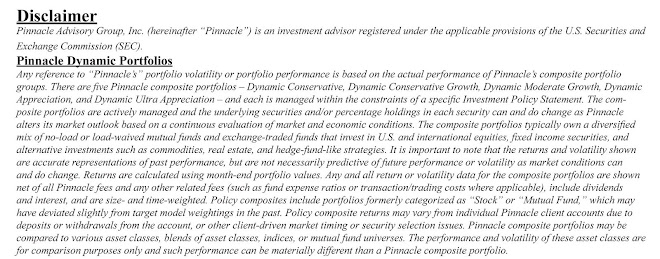This blog may be a little geeky, but bear with me here. In the March/April Financial Analysts Journal, Roger Ibbotson, along with James Xiong, Thomas Idzorek, and Peng Chen, published an article called, “The Equal Importance of Asset Allocation and Active Management.” For those who don’t know, Roger Ibbotson is a giant in the field of finance. His study evaluated thousands of mutual funds and concluded that the market was responsible for about 80% of fund returns and the rest of the return was equally attributed to portfolio policy or active management. Portfolio policy is the same as the portfolio’s benchmark asset allocation. So yours truly, ever on the lookout for studies that minimize the importance of active management, marches into the office of Michael Kitces, our Director of Research at Pinnacle, and says, “Michael, we have to respond to this.” So Michael agrees, and we pen an article that is published in the prestigious Advisor Perspectives online letter that takes issue with Ibbotson’s paper. Kitces and Solow claim that Ibbotson’s study is flawed, that the universe of managers in the study are not active, and that the technique used to determine portfolio returns, called Style Analysis, has the impact of minimizing the benefits of active management.
Our letter created something of a stir. I personally received a number of congratulatory emails describing how we brilliantly enhanced the case for active management. However, Bob Huebscher, the excellent editor of Advisor Perspectives, forwarded several emails to me that took issue with our article. Some were quite reasonable and well thought out, and some were penned by enraged wackos who felt we had no right to breathe the same air as Roger Ibbotson (I should note that Kitces decided to get married and go on his honeymoon while all of this is going on…it was a great wedding!). Anyway, a few of the letters and my replies were published yesterday in this week’s issue of Advisor Perspectives. For one of the letters, as yet unpublished, Huebscher sends the correspondence to a “referee” who is supposed to figure out if there is any merit to any of this squabbling. The referee, who remains anonymous, is actually quite kind to our point of view and says so in his comments. But he ends with the following thought for Huebscher: “My main problem with their article (Solow/Kitces) is that they keep saying ‘excess returns over and above the market’s returns' (attributable to policy allocation and active management), when of course they mean 'over and above, or under and below.’ It’s a typical example of using language to imply that we can expect managers to add value over a market index, when we know that virtually all studies show that on average they don’t, and that there’s no statistical basis for an expectation that they will.”
So, here it is. Kitces and I obviously failed to make our point since the referee restates the same old tired point of view. He correctly states that there is no statistical evidence to suggest that active managers can outperform a market index. The point of our article is, there is no statistical evidence that they can’t! We believe the best active managers can and do outperform, but investors will always have a difficult time figuring out how to assess the performance results of active managers. I’ll be writing more about this, but it comes under the same old category of me complaining about Pinnacle’s performance benchmarks…again.

